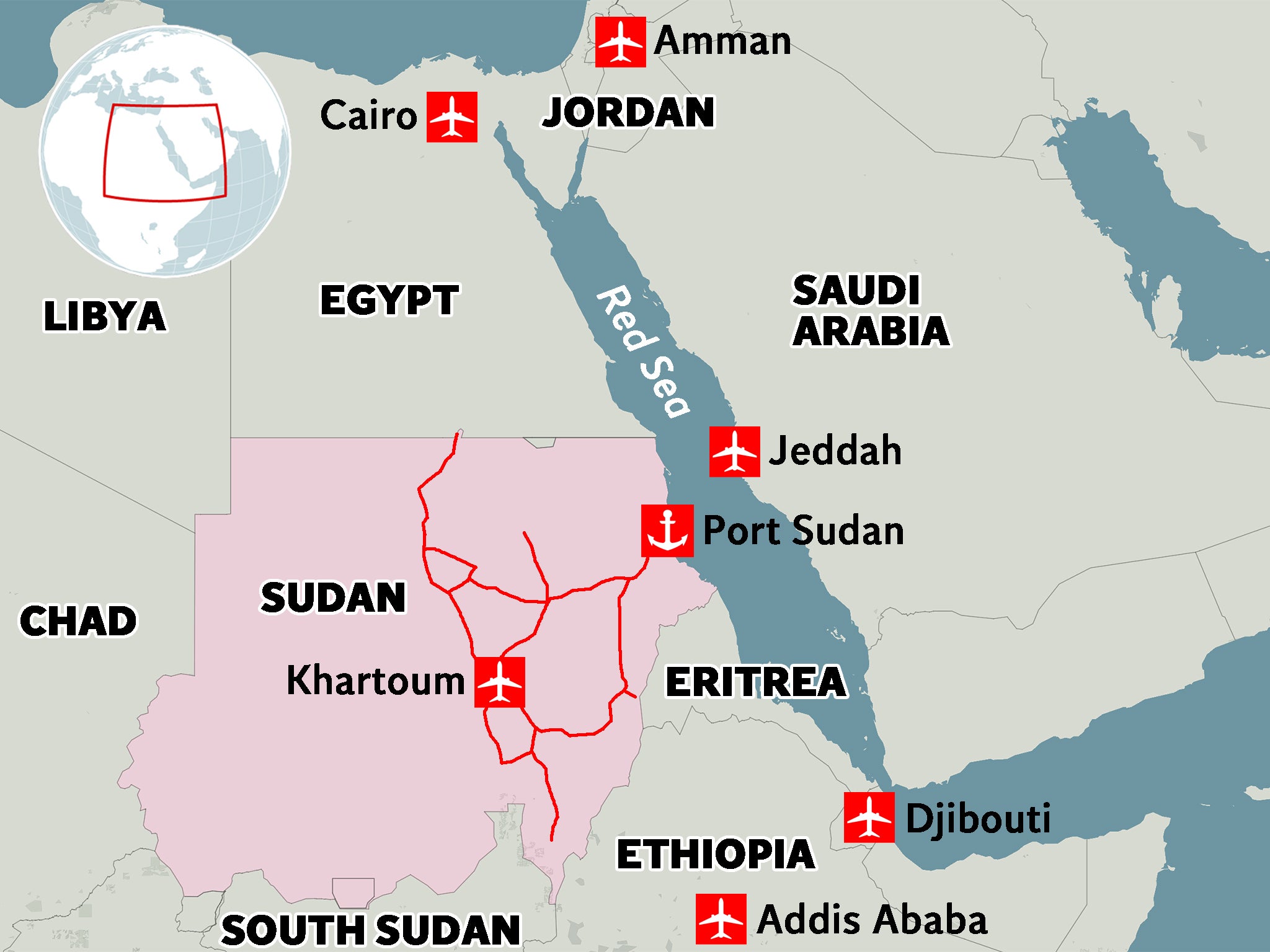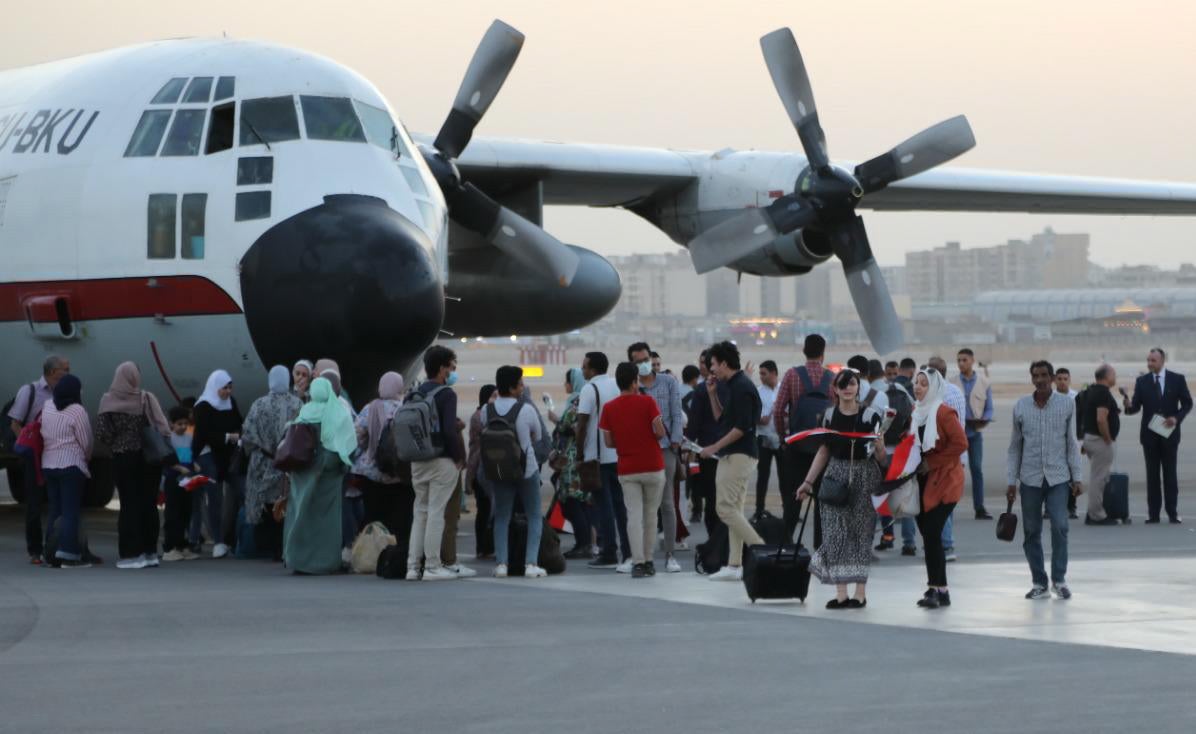
Rishi Sunak has pledged “many more” evacuation flights in what will be a “critical” 24 hours as ministers scramble to rescue Britons from wartorn Sudan.
The prime minister said more than 1,000 people had been contacted, of an estimated 4,000 in the country, and many were making their way to an airfield outside Khartoum.
But the government was forced to defend the timing and handling of the evacuation effort amid claims it had taken its “eye off the ball”.
Ministers denied Britons should have been evacuated earlier, after Germany announced it would complete its operation overnight.
It came as Alicia Kearns, chair of the foreign affairs select committee, urged the government “to commit as many resources as quickly as possible” to the rescue because “there is a very real danger fighting will return”.
Writing in The Independent, she said: “Reports of child soldiers roaming the streets of Khartoum highlight the limitations of any ceasefire, as armed individuals high on adrenaline and looting continue to pose a serious threat.”
Mr Sunak hailed the first flight which left carrying British nationals, adding: “We'll have more flights this evening and we'll have many more into tomorrow."
He added that the next 24 hours “are absolutely critical” as he told staff working on the crisis: “We can make a big push as we’re already doing and you can help us get everyone who wants to come home home.”
The first flight evacuating Britons landed at Larnaca airport in Cyprus on Tuesday evening with 39 people on board, the BBC reported, citing British officials. Around 260 people in total are expected to be flown out of the war-torn nation overnight on three separate flights.
Britons stuck in Sudan have been told to get to the airfield to board RAF evacuation flights “as soon as possible”.
The Foreign Office changed its earlier advice, which asked those stranded to wait until they were called, and urged British passport holders and their immediate family to head to Wadi Saeedna airfield.
The prime minister's official spokesperson said that at least another two more flights were expected overnight, although that was subject to change.
The possibility of a seaborne evacuation from Port Sudan is also being considered, defence secretary Ben Wallace told MPs.
He also admitted that communication with British dual nationals in Sudan was “very patchy” saying efforts were being made “where possible” to invite them to the airport.
Ministers insist Britain’s situation cannot be compared to other countries, because of the large number of Britons and dual nationals in Sudan.
The FCDO said only British passport holders and immediate family members would be evacuated – with children, the elderly and people with medical conditions prioritised for seats on flights.
Foreign secretary James Cleverly said UK nationals must make the risky journey to the airbase near Khartoum without a military escort – warning it is “impossible” to know how long the pause in the fighting will last.
Sudan remains in a “dangerous, volatile and unpredictable” state, Mr Cleverly said, as the RAF used a 72-hour ceasefire deal to launch an ambitious evacuation of thousands of British citizens.
Mr Sunak authorised the evacuation operation late on Monday, Downing Street said.
Evacuees will be taken from the Sudanese airbase back to the UK’s Akrotiri airfield in Cyprus before being brought to Britain.

While just over 2,000 Britons have registered in Sudan with the Foreign Office, there are an estimated 4,000 British nationals and dual nationals still stuck in the conflict-hit country.
Around 120 British military personnel are at the airfield near Khartoum being used for the evacuation effort, Mr Wallace said, telling MPs that a reception team of Border Force and Foreign Office officials were also in place.
“Currently the airfield is run by the German military and, depending on how long they stay, we will stand ready and prepared to take over from them should they decide that their evacuation is finished,” the defence secretary said.
Mr Wallace said two British military ships had been lined up to help and Royal Marines were already in Port Sudan to “establish the safety of the area and any options” so “we are in a good position there should we wish to increase support”.
The defence secretary said HMS Lancaster had been sent to Port Sudan, while the RFA Cardigan Bay would go to the port “at some stage” – raising the ship would be suitable to aid any humanitarian crisis.
The Independent understands land convoys out of the country to near neighbours and among the other exit routes being considered by British military planners.

Mr Cleverly warned the pause is fragile after speaking directly or through intermediaries with faction leaders as he called for them to allow British nationals to be evacuated.
“It is important to remember that ceasefires have been announced and have fallen apart in the past so the situation remains dangerous, volatile and unpredictable,” he said.
The foreign secretary warned UK nationals that they must make their own way to the flights during the pause in fighting between two rival generals engaged in a power struggle.

Mr Cleverly also defended the government from suggestions it should have carried out evacuations of citizens sooner, as European allies had succeeded in doing.
“The circumstances for each individual nation are different. There are considerably more British nationals in Sudan than other countries have got,” he said.
Labour MP Chris Bryant asked foreign office minister Andrew Mitchell whether Britain had taken its eye “off the ball” in the run-up to the conflict.
“I don’t think so,” Mr Mitchell said. “We were watching very carefully over the peace process, it did appear to be making progress,” he added.
The evacuation plan involves similar aircraft to those used to rescue diplomats from Sudan on Sunday, with a second flight possibly bound for Khartoum having left RAF Akrotiri.
US secretary of state Antony Blinken said a three-day ceasefire had been brokered between the army and the Rapid Support Forces (RSF) paramilitary group.
More than 420 people, including at least 273 civilians, have been killed since fighting began on 15 April, and a further 3,700 have been wounded.







